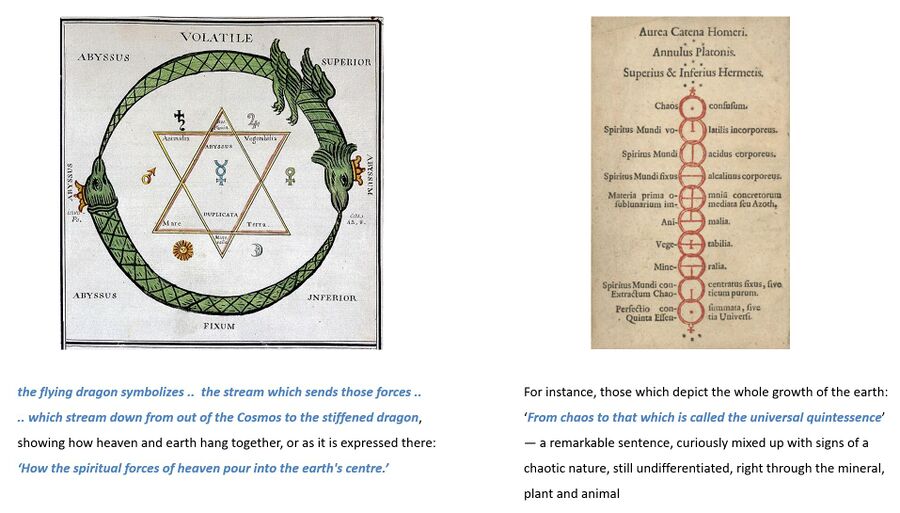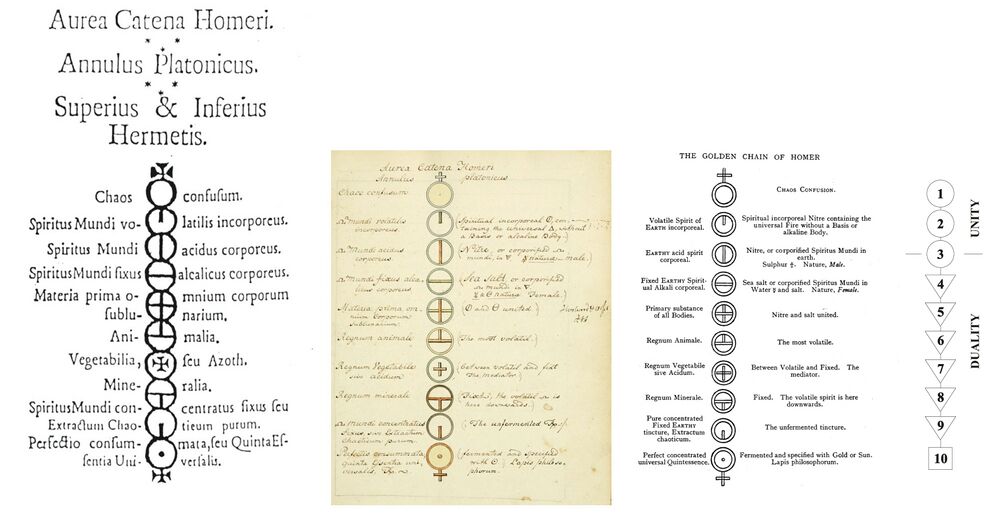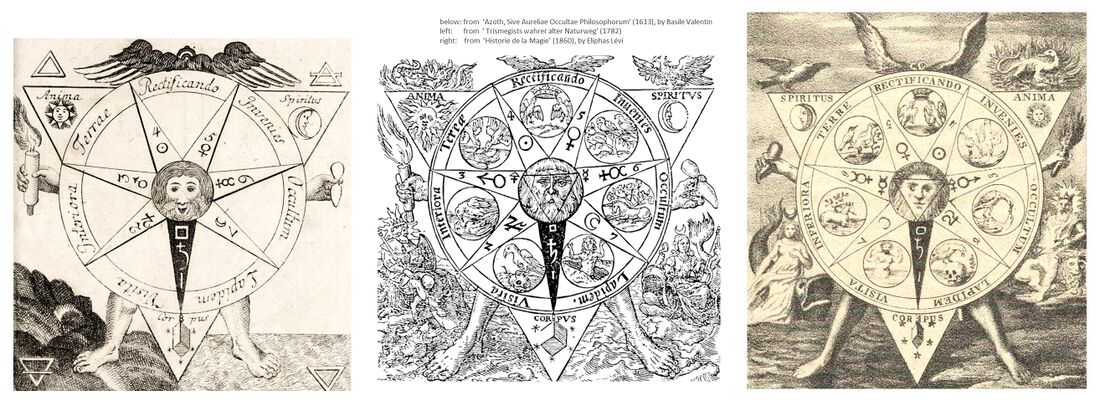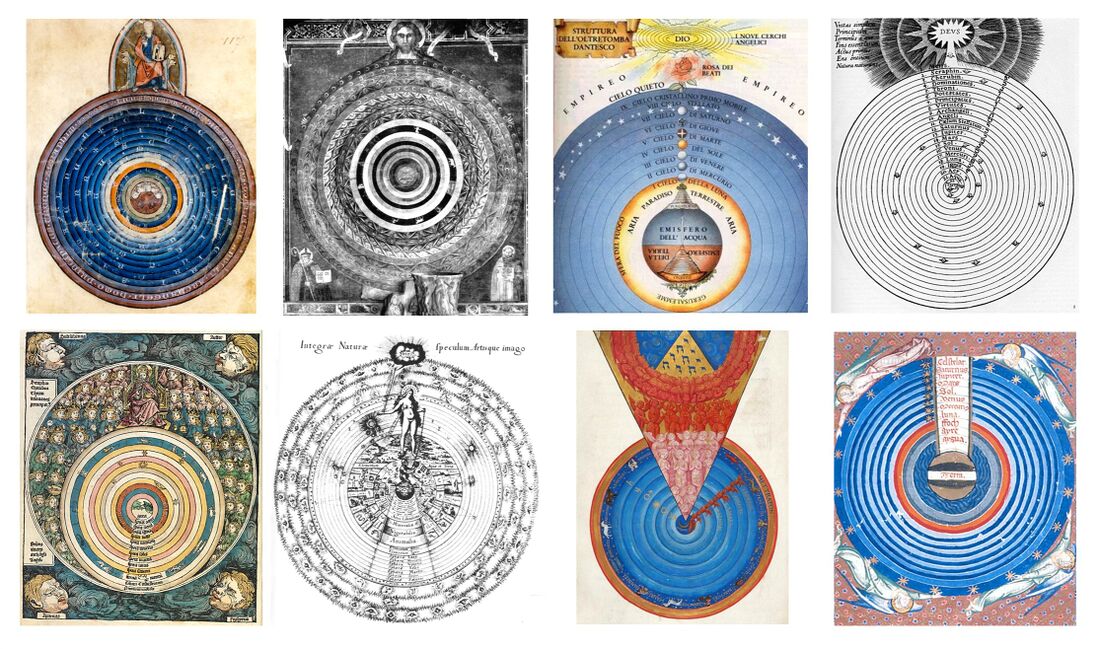Homer’s Golden Chain
The concept of the Golden Chain is an important symbol in alchemy across the ages. The Golden Chain of being originates with the legendary ancient Greek poet Homer, the writer of the Iliad and Odyssey.
It symbolizes the path from (the greek term) 'chaos' to that which is called the universal quintessence, in ten steps of successive 'densification or coagulation'; so it represents a chain from the highest spiritual influences, in multiple steps, down to the substances and kingdoms we see on Earth.
Contemporary references often refer to the work 'Aurea Catena Homeri', published in 1723 by Anton Josef Kirchweger.
References to the concept of the Golden Chain
Although Homer only uses once - in the Iliad - the image of a golden chain hanging from heaven and connecting the human and the divine, this image has inspired all traditions since, with Plato before and Macrobius after Christ, upto the middle ages with Ficino and Valeriano upto Kirchweger and Goethe.
Though the Golden Chain or 'Catena Aurea' was coined by Homer and was used as a reference from the Old Greek throughout the middle ages, it really flows into the processes of Alchemy such as we find in Rosecrucian and Hermetics tradition, and in fact we find symbolic references even in the Bible.
Homer's golden chain is an important image and concept, also for this website to provide a modern education on its meaning and the spiritual reality it represents. Therefore is worthwhile to appreciate this tradition, and the fact this metaphoric image has inspired generations for more than 2000 years.
Aspects
- Goethe was deeply impressed when studying this work, see more on topic page ‘golden vessels interchanging’ which also includes the link with Rudolf Steiner's 'descending and ascending' spiritual influences
- the spiritual scientific explanation is elaborated on
Illustrations
Schema FMC00.002: shows symbolic imagery from Anton Josef Kirchweger's book 'Aurea Catena Homeri' (1723), with underneath the relevant quotes of the lecture 1909-03-11-GA057 called 'Goethe's secret revelation'.
Left: ouroboros, see Schema FMC00.328 on IAO topic page
Right: Homer’s Golden Chain
Schema FMC00.484: shows various illustrations of the 'Aurea Catena Homeri' or Homer's Golden Chain - see also Schema FMC00.002. On the left two copies in Latin, on the right translation to English and a simplified version For an explanation, see Jean Dubuis Mineral Alchemy course Vol 1. Lesson 20.
Schema FMC00.075 combines illustrations from Rosecrucian and Hermetic and alchemical traditions: observe the Golden Chain and the 'raining down' on the upper left, the Sun and Moon as Father and Mother (see Emerald Table below) and how their 'two (etheric) streams' gives rise to the four elements and the three alchemical processes in nature (below right and left).
For explanation of the middle picture see Schema FMC00.207, for the one on the right Schema FMC00.162 see variants and comparative Schemas on the Alchemy and Tetractys topic pages.
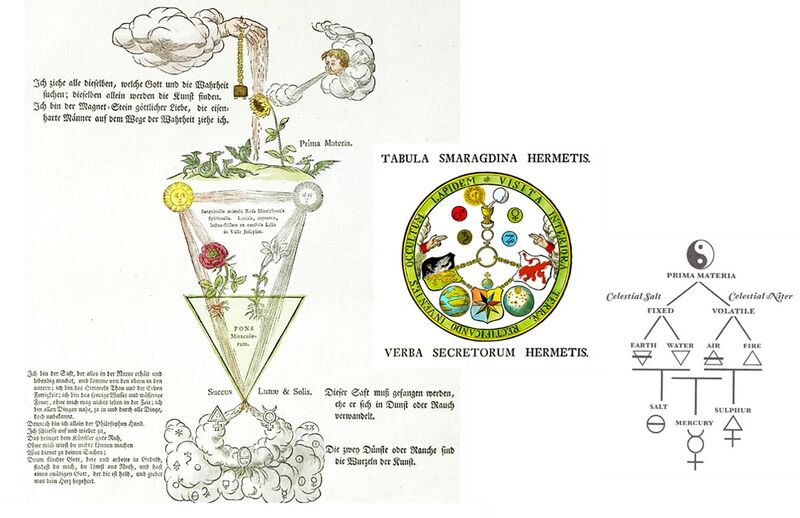
Schema FMC00.207: shows the alchemical VITRIOL medaillon illustration by Basil Valentine (1394-1450) showing Homer's Golden Chain.
Explanation by Jean Dubuis from his Mineral course, Lesson 9.
Note: with such ancient images, sometimes small changes were made as part of the copy process, see eg the change below (reversal of clouds & heaven) on the copy on the left. For another example see Schema FMC00.537.
Schema FMC00.537: shows a famous symbolic representation of a worldview in the esoteric language used in alchemy. The illustration appears first with Basil Valentine around 1600 and was reproduced in different versions by various authors over the centuries.
The illustration contains the male-female duality (2), the triangle of the principles sulphur-mercury-salt (3), the four elements (4), the pentagram of the alchemist (5), six by the combination of the two triangles (6), and seven pointed start or septagram shows the seven planetary influences and alchemical processes (7) modulating what is called on this site the two etheric streams sun and moon (see also Emerald tablet), condensing to mineral earth below from the single energy in the middle. The drawing thus illustrates in synthetic form the relation between key numbers. For further explanations, see Schema FMC00.537A.
The ring contains the acrostic or word composition VITRIOL for 'Visita Interiora Terrae Rectificando Invenies Occultum Lapidem' which, translated freely, means 'visit the interior of the Earth and by rectifying you will find the hidden stone' (see Schema FMC00.207 for explanation).
Schema FMC00.536: illustrates a spiritual scientific cosmogony with various representations dating from the middle ages. The various spheres represent the planes or worlds of consciousness with the seven planetary spheres and the fixed stars, the spiritual hierarchies and the Logos or 'god'.
This representation takes the human kingdom perspective on Earth as the center, and shows how creation is made up of these spiritual hierarchies and their influences from the various worlds. It is therefore a graphical way to depict, in a single picture, a worldview and understanding of the make up of the cosmos and what underlies the Cosmic fractal.
All images position creation: Man and humanity (with the kingdoms of nature and Earth), in a frame (with God the creator and) main elements: (1) the planetary spheres modulating (2) zodiacal spiritual influences, as linked to (3) the spiritual hierarchies. This puts Man at the center of divine creation, solar system and cosmos, being the crown of creation rather than just another speck in the wide empty universe, as is the case in the contemporary materialistic worldview of mineral science.
Sources and commentary on the full-sized versions will be added to the Schema variants and topic page (still to be done).
Lecture coverage and references
Homer's Golden Chain
Homer - Iliad
In the Iliad (often dated around 8th century BC), Homer speaks about the chain that links earth and heaven, and by which humans may ascend to the realm of the gods. In this passage Zeus declares that all the gods and goddesses together could not, with a golden chain, drag him from on high, but that if he pulled, he would drag them, with earth and sea, would then bind the chain round the summit of Olympus, and all the rest would hang aloft. Quote from Iliad (Hom. Il. 8.18):
If I see anyone acting apart and helping either Trojans or Danaans, he shall be beaten beyond the limits of universal order [kosmos] ere he come back again to Olympus; or I will hurl him down into dark Tartaros far into the deepest pit under the earth, where the gates are iron and the floor bronze, as far beneath Hades as heaven is high above the earth, that you may learn how much the mightiest I am among you. Try me and find out for yourselves.
Hang me a golden chain from heaven, and lay hold of it all of you, gods and goddesses together - tug as you will, you will not drag Zeus the supreme counselor from heaven to earth; but were I to pull at it myself I should draw you up with earth and sea into the bargain, then would I bind the chain about some pinnacle of Olympus and leave you all dangling in the mid firmament.
So far am I above all others either of gods or men.
1909-03-11-GA057
lecture called: 'Goethe's secret revelation'
two translations version 1 and version 2
quote from V1
Goethe then went to Frankfort and came into touch with thoughtful, sensible men who possessed above all things through their developed soul life, something of the flowing together of the human inner life with the spiritual weaving and living in the world; men who in the fullest meaning of the word, felt in themselves what Goethe expresses in the words: ‘The self in them expands to a spiritual universe.’ At that time at Frankfort he had the feeling, ‘Away from the mere striving after ideas! Away from the merely perceptive sense observation! There must be a path to the sources of existence!’ and he came into touch with what one can call alchemistic, mystical and theosophical literature. He himself attempted the practice of alchemy. He relates how he came to know of a work through which many sought for similar knowledge at that time, Welling's ‘Opus Mago-Cabalisticum et Theosophicum.’ This book was much thought of then as giving a knowledge of the sources of existence. Goethe studied by degrees Paracelsus, Valentinus and above all a work which from its whole method must have produced a deep impression on all those who strove after such knowledge, ‘Aurea Catena Homeri.’ This was a representation of nature the Mystics in the Middle Ages believed to see. The study of these mystical, alchemistic, theosophical books must have had a similar effect on Goethe to that which a man striving to-day after the same things would experience if he took up the books of Eliphas Levy or any other thinker on the same lines. Indeed at that time these things must have had an even more bewildering effect upon Goethe because these different writers no longer really understood the magic, theosophy, etc., of which they wrote. It was impossible to speak in direct way of the real grandeur and meaning of these things, proceeding from an ancient wisdom which had lived in human souls, for the meaning was hidden under an outer garb which included all kinds of physical and chemical forms. For those who merely saw what appeared outwardly in these books it was the greatest nonsense, and at that time it was most difficult to penetrate behind these secrets and arrive at the real meaning. But we must not forget that Goethe from his deep striving for knowledge had developed an intuitive mind.
He must have been greatly pleased when on opening the ‘Aurea Catena Homeri’ he saw on the first page a symbol which had a deep effect on his soul; two triangles interlaced; in the corners the signs of the planets, drawn in a wonderful way, a flying dragon wound round in a circle, beneath which another dragon had fixed stiffening itself, and when he read the words on the first page, saying that the flying dragon symbolizes the stream which sends those forces which stream down from out of the Cosmos to the stiffened dragon, showing how heaven and earth hang together, or as it is expressed there: ‘How the spiritual forces of heaven pour into the Earth's centre.’
These mysterious signs and words must have made a great impression upon Goethe. For instance, those which depict the whole growth of the earth: ‘From chaos to that which is called the universal quintessence’ — a remarkable sentence, curiously mixed up with signs of a chaotic nature, still undifferentiated right through the mineral, plant and animal kingdoms, right up to man and to that perspective to which man is developing in ever greater refinement.
But it was not easy to find a way of penetrating to the deeper meaning. So Goethe left Frankfort in a frame of mind which can be described in the following words: I have found nothing. These seekers into nature can only give me dry, empty ideas; anything that can be squeezed out of them is but life's water. I have busied myself with much that has come down to us from the past from those who declare that they saw into the secrets of life. But the way, the way drives one to despair!
quote from V2
Today, unfortunately, one considers such striving too cursorily. Today one sees people approaching swiftly, and then they are soon ready with it if they have a few concepts in the soul.
Someone only knows which riddles are there who can look back at the time twenty, thirty years ago when a fluid flowed into his soul. There many things have settled on it and many a thing approached him. Years and experiences have followed; and thirty years later is that which flowed into his soul mature to receive an answer to it if only roughly.
We cannot look deeply enough just from this point of view at Goethe's life, and we feel the mood Goethe himself could feel from the Aurea catena Homeri, the Golden Chain of Homer; we see it expressed if he erupts in the words of Faust: “How grand a show!” Indeed, it is a tremendous show, if the soul immerses in these pictures without having any notion of what they are. It is a show. However, does it keep to this notion?
...
He got to know alchemical, mystic and theosophical literature. He made practical alchemical experiments. He himself tells how he got to know a work in which some people searched similar ways at that time: Welling's (Georg von W., 1655–1727, German alchemist and theosophist) Opus mago-cabalisticum et theosophicum (1719), a work which was regarded at that time as a way to recognise the springs of existence. He gets to know Paracelsus, Basil Valentine (Basilius Valentinus, unidentified German alchemist), and above all a work which had to make a deep impression on all striving people, the Aurea catena Homeri (1723, published anonymously). This was a representation of nature as the medieval mystics believed to behold. The mystic, alchemical and theosophical works Goethe got to know made the impression on him that possibly today any similarly striving human being gets if he, for my sake, takes books by Éliphas Lévy (1810–1875, French occultist) or similarly minded spirits. Yes, at that time these things made a more confusing impression on Goethe because the representation of the different writings, which dealt with magic, theosophy and so on, was such that, indeed, behind the external symbols secrets were hidden which those who had written these books no longer understood.Because one could not pronounce the real ancient wisdom in its immediate greatness and meaning, it is clothed in an external unsubstantial garment, clothed in all kinds of physical and chemical formulae. However, on someone who saw what he can read in the books externally it made the impression of absolute nonsense, and at that time there was no way to unravel the secrets and to penetrate into the sense. However, is not allowed to misjudge that Goethe was an apprehensive spirit because of the depth of his quest for knowledge. There it must appear odd to him opening the Aurea catena Homeri and looking at the symbol on the first page deeply touching his soul: two intertwined triangles, at the corners the planetary signs, around them two dragons, a flying one above, and one without wings below, forming a circle. When he read the words on this page that the volatile dragon symbolises the current that instils those powers to the dragon below which flow down from the universe, or how heaven and earth are connected, with other words, as one reads there: “How the heaven's spiritual powers pour forth in the centre of earth.”
Such signs and words must deeply work on Goethe. For example, those that showed the whole development of the world, as one said “from the chaos up to the universal quintessence.” It shows a strange transition in oddly intertwined signs from the chaotic matter, which is not yet differentiated through the mineral, plant, and animal realms up to the human being and to those perspectives, to which the human being advances, to continuous refinement.
References to the Golden Chain
Christ-Jesus
said
I am the living bread of life that came down from heaven.
The Tabula Smaragdina Hermetic or Emerald Table
It is true, certain, and without falsehood, that whatever is below is like that which is above; and that which is above is like that which is below: to accomplish the one wonderful work. As all things are derived from the One Only Thing, by the will and by the word of the One Only One who created it in His Mind, so all things owe their existence to this Unity by the order of Nature, and can be improved by Adaptation to that Mind.
Its Father is the Sun; its Mother is the Moon; the Wind carries it in its womb; and its nurse is the Earth. This Thing is the Father of all perfect things in the world. Its power is most perfect when it has again been changed into Earth. Separate the Earth from the Fire, the subtle from the gross, but carefully and with great judgment and skill. It ascends from earth to heaven, and descends again, new born, to the earth, taking unto itself thereby the power of the Above and the Below. Thus the splendor of the whole world will be thine, and all darkness shall flee from thee. This is the strongest of all powers, the Force of all forces, for it overcometh all subtle things and can penetrate all that is solid. For thus was the world created, and rare combinations, and wonders of many kinds are wrought.
Hence I am called Hermes Trismegistus having mastered the three parts of the wisdom of the whole world. What I have to say about the masterpiece of the alchemical art, the Solar Work, is now ended.
Plato
Plato (427-347 BC) has two or three quotes either literally or more descriptively to the concept of the golden chain, the most often quotes not necessarily the most interesting: (Theaet. 153c)
it learns nothing and forgets what it has learned?
Theaetetus: Certainly.
Socrates: Then the good, both for the soul and for the body, is motion, and rest is the opposite?
Theaetetus: Apparently.
Socrates: Now shall I go on and mention to you also windless air, calm sea, and all that sort of thing, and say that stillness causes decay and destruction and that the opposite brings preservation? And shall I add to this the all-compelling and crowning argument that Homer by “the golden chain”1 refers to nothing else than the sun,
Neoplatonists Proclus and Procopius
A discussion of the metaphors of the Golden Chain in the Neoplatonist school of Athens is given in John Glucker's 'Antiochus and the Late Academy' (1978), examples are:*Proclus (412-485) in the commentary on Timaeus, described the Hermaic chain as a demiurgic emanation of reason and harmony' stretching from heaven to earth, to describe the unbroken vertical connection with the first principles (noetic sources of the demiurgic descent) and the horizontal or historical succession of the qualified masters and interpreters.
- Procopius (500-570) in his work on buildings 'De aedificiis', describes dome of Hagia Sophia as seemingly suspended from the golden chain of heaven
Macrobius
Macrobius (370-430) in his most influential book 'Commentary on the dream of Scipio'
Since from the supreme good, mind arises, and from mind, soul, and since this in turn creates all subsequent things and fills them all with life, and since this single radiance illumines all and is reflected in each, as a single face might be reflected in many mirrors placed in a series; and since all things follow in continuous succession, degenerating to the very bottom of the series, the attentive observer will discover a connection of parts from the supreme God to the last dregs of things, mutually linked together and without a break. This is Homer's golden chain, which God, he says, bade hang down from heaven to earth. Having said that, Homer asserts that Man alone among earthly creatures has a common fellowship of mind, or soul, with heaven and the stars.
Pietro Valeriano
Pietro Valeriano (1477-1558) made a round-up of interpretations in Hieroglyphica' (1556). This book - the first modern study of Egyptian hieroglypshs - was a classic, a very popular book in Europe, represented seven times over 120 years in Latin, translated early on in French and Italian. In this book, under the heading 'Homerica Aurea Catena' he writes:
There can be no doubt that this golden chain .. signifies, according to the testimony of Macrobius and Lucian, the connection between human and divine beings, and the bond by which God when he pleases draws us to himself, where we could never ascend by our own efforts: such that he wishes to show that his spirit is directed by God, may appropriately depict this chain hanging from a star and drawing him to it
More
- To illustrate the image of the golden chain and its symbolism may pop up everywhere, here's an example of a golden chain appearing in Anthony van Dyck's self-portret painting 'Self-Portrait with a Sunflower' (around1632-1633). See interpretation John Peacock's 'The Look of Van Dyck: The Self-Portrait with a Sunflower and the Vision of the Painter' (2006)
Discussion
See also: poem by Robert Thibodeau: The Seven Planetary Conditions in the Waking Day, Homer's Golden Chain or Golden Thread Sutra
Related Pages
References and further reading
- Annulus Platonis (Aurea Catena Homeri) oder physikalisch-chymische Erklärung der Natur nach ihrer Entstehung, Erhaltung und Zerstörung
Einer Gesellschaft aechter Naturforscher aufs neue verbessert und mit vielen wichtigen Anmerkungen herausgegeben von A.J. Kirchweger (1920 edition, Wort und originalgetreu nach der Rosenkreuzer-Ausgabe von 1781)
- The Golden Chain of Homer (The R.A.M.S. Library of Alchemy) (2015)
References to the Golden Chain
- John Glucker: 'Antiochus and the Late Academy' (1978)
- John Peacock : 'The Look of Van Dyck: The Self-Portrait with a Sunflower and the Vision of the Painter' (2006)

